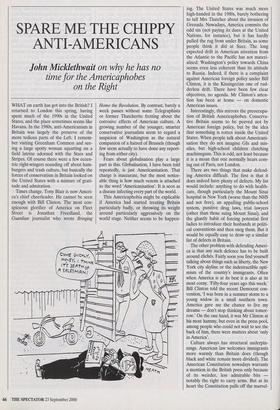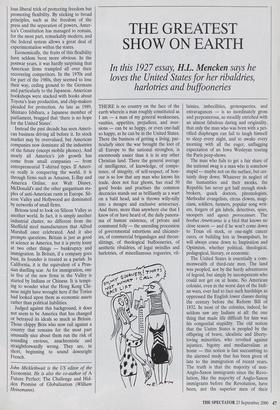SPARE ME THE CHIPPY ANTI-AMERICANS
John Micklethwait on why he has no
time for the Americaphobes on the Right
WHAT on earth has got into the British? I returned to London this spring, having spent much of the 1990s in the United States, and the place sometimes seems like Havana. In the 1980s, anti-Americanism in Britain was largely the preserve of the more tedious parts of the Left. I remem- ber visiting Greenham Common and see- ing a large spotty woman squatting on a field latrine adorned with the Stars and Stripes. Of course there were a few eccen- tric right-wingers sounding off about ham- burgers and trash culture, but basically the forces of conservatism in Britain looked on the United States with a mixture of grati- tude and admiration.
Times change. Tony Blair is now Ameri- ca's chief cheerleader. He cannot be seen enough with Bill Clinton. The most con- spicuous glorifier of America on Fleet Street is Jonathan Freedland, the Guardian journalist who wrote Bringing Home the Revolution. By contrast, barely a week passes without some Telegraphista or former Thatcherite fretting about the corrosive effects of American culture. A growing number of the younger, smarter conservative journalists seem to regard a suspicion of Washington as the natural companion of a hatred of Brussels (though few seem actually to have done any report- ing from either city).
Fears about globalisation play a large part in this. Globalisation, I have been told repeatedly, is just Americanisation. That charge is inaccurate, but the most notice- able thing is how much venom is attached to the word 'Americanisation'. It is seen as a disease infecting every part of the world.
This Americaphobia might be explicable if America had started treating Britain particularly badly, or throwing its weight around particularly aggressively on the world stage. Neither seems to be happen- ing. The United States was much more high-handed in the 1980s, barely bothering to tell Mrs Thatcher about the invasion of Grenada. Nowadays, America commits the odd sin (not paying its dues at the United Nations, for instance), but it has hardly pulled the rug from under Britain, as some people think it did at Suez. The long expected drift in American attention from the Atlantic to the Pacific has not materi- alised: Washington's policy towards China seems even less coherent than its attitude to Russia. Indeed, if there is a complaint against American foreign policy under Bill Clinton, it is the Kissingerian one of rud- derless drift. There have been few clear objectives, no agenda. Mr Clinton's atten- tion has been at home — on domestic American issues.
Interestingly, this mirrors the preoccupa- tion of British Americaphobes. Conserva- tive Britain seems to be peeved not by American foreign policy, but by the idea that something is rotten inside the United States. When people talk about Americani- sation they do not imagine GIs and mis- siles, but high-school children clutching machineguns. This is odd, not least because it is a moan that one normally hears com- ing out of Paris, not London.
There are two things that make defend- ing America difficult. The first is that it does indeed have plenty of defects. My list would include: anything to do with health- care, though particularly the Mount Sinai hospital in New York (worse than the NHS and not free), an appalling public-school system, punitive drug laws, trial lawyers (other than those suing Mount Sinai), and the ghastly habit of forcing potential first ladies to introduce their husbands at politi- cal conventions and then snog them. But it would be equally easy to draw up a similar list of defects in Britain.
The other problem with defending Ameri- ca is that any such defence has to be built around clichés. Fairly soon you find yourself talking about things such as liberty, the New York city skyline or the indestructible opti- mism of the country's immigrants. Often when America is at its best it is also at its most corny. 'Fifty-four years ago this week,' Bill Clinton told the recent Democrat con- vention, 'I was born in a summer storm to a young widow in a small southern town. America gave me the chance to live my dreams — don't stop thinking about tomor- row.' On the one hand, it was Mr Clinton at his most hammy, but even in the press pool, among people who could not wait to see the back of him, there were mutters about 'only in America'.
Culture always has structural underpin- nings. American law welcomes immigrants more warmly than Britain does (though black and white remain more divided). The American Constitution nowadays warrants a mention in the British press only because of its weirder, less admirable bits notably the right to carry arms. But at its heart the Constitution pulls off the marvel- lous liberal trick of protecting freedom but promoting flexibility. By sticking to broad principles, such as the freedom of the press and the separation of powers, Amer- ica's Constitution has managed to remain, for the most part, remarkably modern, and the federal system allows a great deal of experimentation within the states.
Economically, the fruits of this flexibility have seldom been more obvious. In the postwar years, it was hardly surprising that American firms trampled all over their recovering competitors. In the 1970s and for part of the 1980s, they seemed to lose their way, ceding ground to the Germans and particularly to the Japanese. American bookshops were stacked with books about Toyota's lean production, and chip-makers pleaded for protection. As late as 1989, Shintaro Ishihara, a Japanese member of parliament, bragged that 'there is no hope for the United States'.
Instead the past decade has seen Ameri- can business driving all before it. Its stock market may be overvalued, but American companies now dominate all the industries of the future (except mobile phones). And nearly all America's job growth has come from small companies — from entrepreneurial T-shirted types. If Ameri- ca really is conquering the world, it is through firms such as Amazon, E-Bay and America Online, not Walt Disney, McDonald's and the other gargantuan sta- ples of anti-American rants in Europe. Sil- icon Valley and Hollywood are dominated by networks of small firms.
Britons tend to look on Silicon Valley as another world. In fact, it is simply another industrial cluster, no different from the Sheffield steel manufacturers that Alfred Marshall once celebrated. And it also prompts questions. Britain is just as good at science as America, but it is pretty lousy at two other things — bankruptcy and immigration. In Britain, if a company goes bust, its founder is treated as a pariah. In California, it is the equivalent of a Prus- sian duelling scar. As for immigration, one in five of the new firms in the Valley is started by Indians or Chinese. It is tempt- ing to wonder what the Hong Kong Chi- nese might have wrought here if the Tories had looked upon them as economic assets rather than political liabilities.
Judged against this background, it does not seem to be America that has changed or betrayed its ideals so much as Britain. Those chippy Brits who now rail against a country that remains for the most part unusually nice about them run the risk of sounding envious, anachronistic and straightforwardly wrong. They are, in short, beginning to sound downright French.
John Micklethwait is the US editor of the Economist. He is also the co-author of A Future Perfect: The Challenge and Hid- den Promise of Globalisation (William Heinemann).























































































 Previous page
Previous page